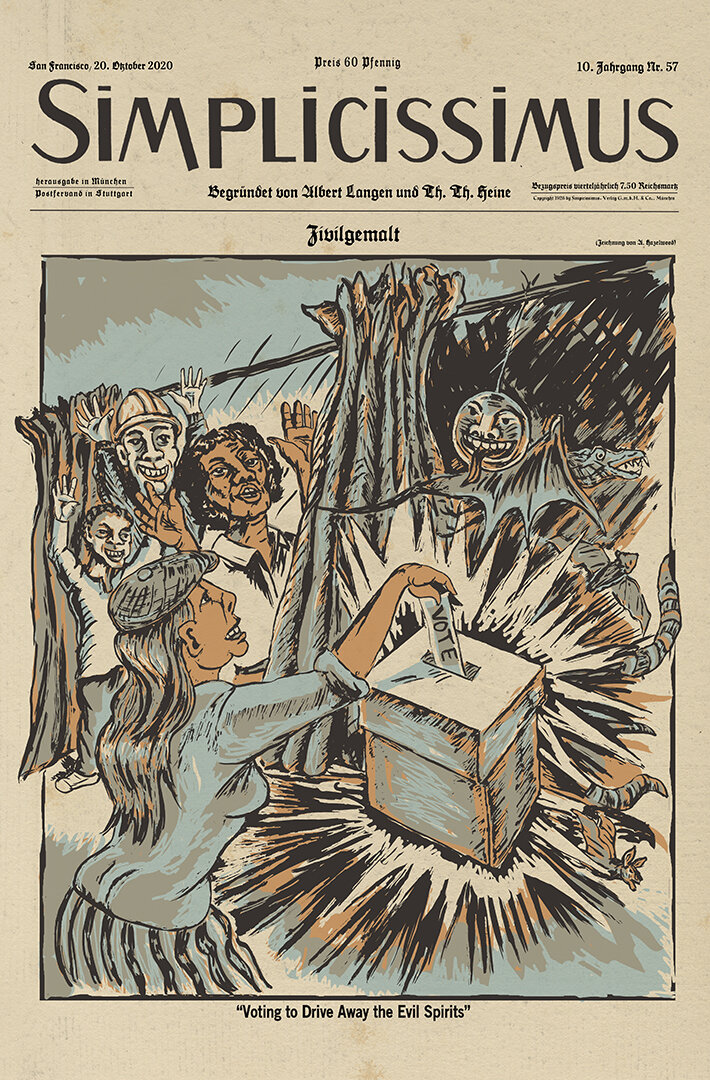The Sacred Psyche: C.G. Jung's Psychology of Religion
Guest Post by David Odorisio (Originally published on his blog). I post it here as one of the most succinct articulations of our current societal crisis and loss of meaning. J.H.
Many consider ours the "age of anxiety" with near-constant threats of terror, fear, and ecological disaster at alarmingly global levels. Who has time to reflect upon or consider the deeper psychological and spiritual realities underlying these crises, much less the interest or courage or examine one's own role in these complicated and challenging world events? To Jung, religion, or a "religious attitude" was a means for examining the deeper mysteries of life, and offered a vision of wholeness and healing amidst challenging and difficult times.
Jung's own psychological and spiritual outlook was formed during World War I and only further strengthened through witnessing the atrocities of World War II. Jung knew the dark side of human nature through both the cultural and political events of his time, as well as through the personal lives of his many clients, who brought to his attention the growing sense of alienation, fragmentation, and inter-personal disconnect that continue to plague many of us today despite the myriad advances in technology and so-called "social" media. There is an emptiness in our culture that all of the social and economic security in the world could not cure. To Jung, it was the religious impulse - inherent in the sacred nature of the psyche (soul) - that has the potential to heal the restlessness and material craving so prevalent in our time, and provide us with living symbols, rituals, and rites of passage to meaning-make life's transitions and encounter a world ensouled.
The Numinous: Encountering the Sacred
Jung used religious scholar Rudolf Otto's term numinous (from the Latin, numen, or "divine presence") to describe the ineffable and mysterious presence of the Sacred. Otto defined this as a feeling of awe, of standing in the presence of a great mystery, a humbling power greater than one's own limited self. The felt presence of the numinous became a marker for Jung of authentic religious experience, which he favored over the rote repetition of ritual for obligation's sake. To Jung, it was the encounter with the Sacred that formed the center of a whole and fully human life, and was central to the process of healing and individuation as he understood it.
Scripture and the Sacred Psyche
Sacred Scriptures from across the world's religious traditions help us to appreciate and enter into a relationship with the numinous aspects of the psyche, or soul. The ancient practice and art of lectio divina, or sacred reading, serves as a tool to make oneself fully present to the living wisdom hidden within a text. For thousands of years people have ruminated (literally, "to chew") on passages of such sacred texts as the Bhagavad Gita, Yoga Sutras, Upanisads, Tao te Ching, and of course the Hebrew, Christian, and Islamic Scriptures. When we live with texts, they become part of our sacred vocabularly, and provide a subtle yet profound entry point into a living relationship with the divine.
When we read and listen to Scripture - from all traditions - with the ear of the Soul, metaphor replaces literal interpretation, so the Exodus and desert experience of the ancient Israelites becomes our own arid separation and search for the presence of God, or "promised land." Pharoah becomes our own internalized voices of oppression, and Moses, our own personal and often reluctant hero and redeemer within. When we read Scripture with an ear towards Soul, the texts and traditions of our ancestors resonate and often reveal the living voice of our own deeply personal and unique journey to Self.
A Therapeutic Approach to Religion
Jung has a famous quote that of the many hundreds of patients he treated in the "second half of life" (which he defines as over the age of 35), "there has not been one whose problem in the last resort was not that of finding a religious outlook on life" (Modern Man in Search of a Soul). What Jung meant by this, was that for many individuals, the loss of a living religious or spiritual belief system and practice has led to a wide-spread loss of soul. To Jung, religion is not defined through institutionalized practices, but as a personal need to invoke and invite the Sacred into our daily lives. Religion, and its counterpart, ritual, help us to meaning-make the moments and transitions of our lives, to find a deeper sense of purpose embedded in the mundane, and to connect with a power greater than our limited selves throughout our lives.

















